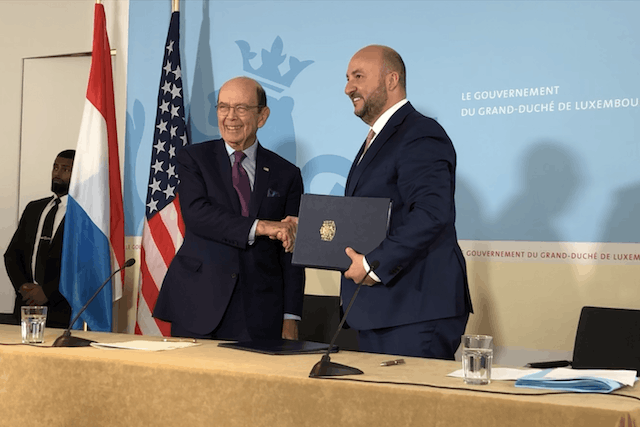US secretary of commerce Wilbur Ross, who was in Luxembourg to sign on behalf of the United States, said the MoU “will serve as a foundation for establishing a stable and reliable commercial global space industry”.
Deputy PM Etienne Schneider called the signing a “historic milestone for the bilateral relationship” between the two countries, one which he hopes will “evolve positively”. He added that some 100 US companies contribute to the grand duchy’s economy, especially in industry (he cited Goodyear, Guardian and Ampacet among others), tech (Amazon, Cisco, Microsoft) and finance (JP Morgan, Franklin Templeton).
Noting that the space industry represents 2% of Luxembourg’s GDP--the highest in the EU--Schneider added, “Already today, Luxembourg is taking up more space in space than on Earth.” He went on to thank US Ambassador to Luxembourg Randy Evans for his role in helping to make the MoU a reality.
“Unusually detailed and specific”
Although details of the MoU had not been made public, Ross said it was “unusually detailed and specific”--ranging from communications and transportation to civil space exploration, R&D and Earth observation. He also said it would touch on “common security”.
Ross praised Luxembourg as having “distinguished itself within Europe and the world by recognising the value of the commercial space industry”, noting specifically its role in private space communications, for example the government’s support of SES, created in 1985, which is the world’s largest commercial satellite operator. He said some growth will come from the expansion of space services, such as GPS and telecoms, but also through newer endeavours, including space tourism and asteroid mining.
Ross, who has over 55 years' experience in private equity and investment banking and who resigned from the ArcelorMittal board once he was confirmed for his current role, said Luxembourg was “wise to focus on a few selected segments of space activity rather than trying to be all things to all people.
He added that he looked forward “to extending partnership to include space exploration through Nasa, our department of defence and Nato”.
Race in outer space?
Although it isn’t clear to what degree defence plays a role, Ross did state in a communiqué related to the signing that the MoU was one which “allows for partnership on important space problems like regulatory reform and space debris”.
It is estimated some one-third of all space debris is from China’s destruction via a ground-based missile in 2007 of a defunct satellite, as well as the 2009 collision between two satellites--one American, the other Russian. Some observers saw the 2007 missile destruction as China showcasing its growing military capabilities in space, thus posing national security questions linked to the challenges of cleanup or hazards posed by space debris.
When asked about trade wars between China and the US, however, Ross made it clear: “The trade discussions with China is a very separate activity,” adding that higher tarrifs would indeed be imposed if the two countries weren’t able to agree on an arrangement. He added: “The US is comfortable with the outcome whichever way it goes, but we’d be happy if we could have an agreement with China. It remains to be seen if that can be done.”
